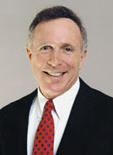|
Ron Shapiro: Negotiating with the Power of Nice
LS: When did you first start as a sports agent? Ron Shapiro: I first began as a securities lawyer involved with investment law. My background prior to that was securities commissioner for the state of Maryland. I regulated all the investment in the state. That brought me to baseball a few years later because Brooks Robinson had difficulties with some bad investments that advisors put him into. In 1976, the Baltimore Orioles baseball team called me to help him, which obviously was a thrill. Brooks then asked me to negotiate his first baseball contract. That was my beginning in a career of advising baseball players and broadcasters. Steve Bell, who was a broadcaster with "Good Morning America" came to me and asked, ‘Why don't you apply the same thing to broadcasters?' This was the beginning of my working with an array of broadcasters helping them manage their finances and negotiating their contracts. LS: Do you remember your first negotiation and what was the outcome? RS: My first negotiation was for Brooks Robinson. I preach in my book, The Power of Nice, the three P's - Prepare, Probe and Propose. I might have been the best prepared negotiator in the world but I didn't know the other two rules at the time, probing and proposing. I went in there with Hank Peters, a great friend of mine now, who was then the General Manager of the Orioles. Peters said nothing and I said everything. He learned everything about me and I learned nothing about him. When he finished and I made my proposal, instead of accepting it Peters said he would get back to me. I learned a big lesson that day. It's not only about presenting, it's about probing, asking questions and listening and coming away with information before you make proposals. I learned it from Hank and until this day I tell people I'll get back to them. LS: When did you start representing Jon Miller, who is one of our ASA Board of Directors? RS: It had to be 10 or 15 years ago when he was in Baltimore. What a thrill it is to be representing Jon because he is a man who really believes in the principles of the "Power of Nice." He believes in getting a fair deal for yourself but in being nice to the other side and building a relationship. LS: You were very instrumental in the 1994-95 baseball strike negotiations. Tell us about that. RS: In 1994-95, I and some others helped mediate between the two sides and helped craft a settlement, albeit an impermanent settlement, because we had to go through it again this year. I also was involved in the umpires recreating themselves when a group separated themselves from Richie Philips. So I have been involved in a number of issues in baseball aside from the negotiations of contracts for players. LS: What about this last baseball negotiation. Who were the winners and who were the losers? RS: The fan was going to lose, but I think they won because the fan applied pressure to both sides. I think that ultimately caused the parties to do something they had never done before and that was to settle without a work stoppage. If they hadn't settled without a work stoppage, it could have been calamitous for the game, for the players, and the owners. It's not a good settlement for anybody but at least its closer to a win-win situation unlike in the past when it was a win-lose or a lose-lose. LS: How did the Shapiro Negotiations seminars, which by the way are wonderful, get started? RS: I decided in 1995 that I wanted to take my years of experience as a corporate lawyer, as an advisor/negotiator and take it out into the business world under the concept of "The Power of Nice." I want to emphasize that it's not just being nice and giving in because I always say that win-win is not wimp-wimp. It's about doing good deals that work for everyone and allow you to build strong relationships. That's a business concept that you saw today because businesses from every conceivable industry were here and they all embrace this concept. We have now had the opportunity to educate over 100,000 people and it's a thrill for me because it's a culmination of everything I've ever done. I still represent people and still do some lawyering, but I have a passion for teaching, and this allows me to fulfill that passion.
|
